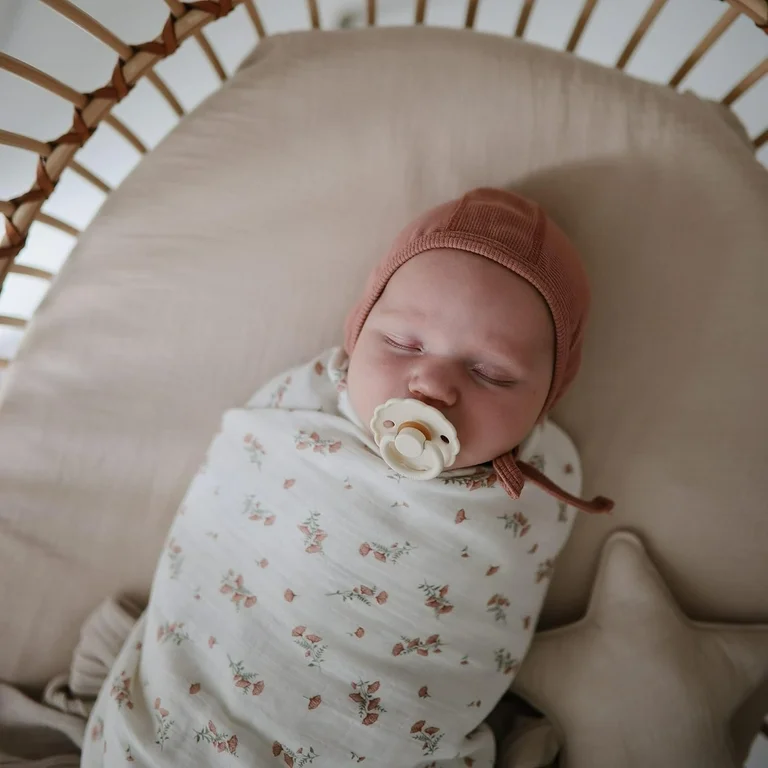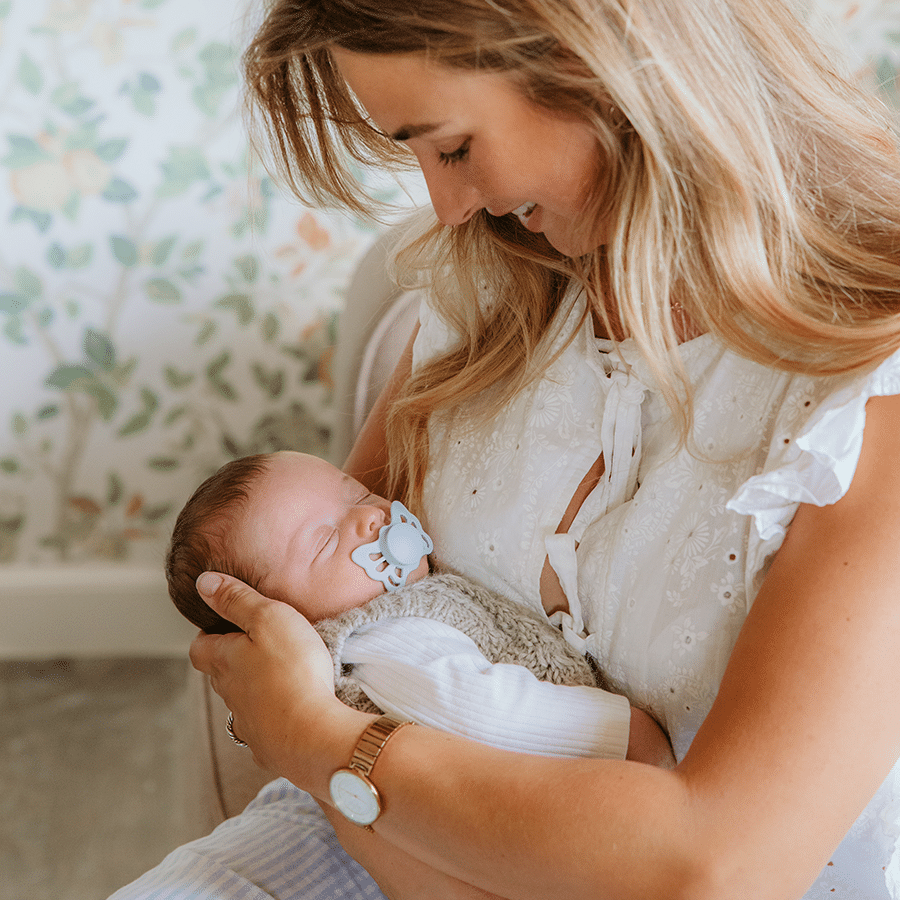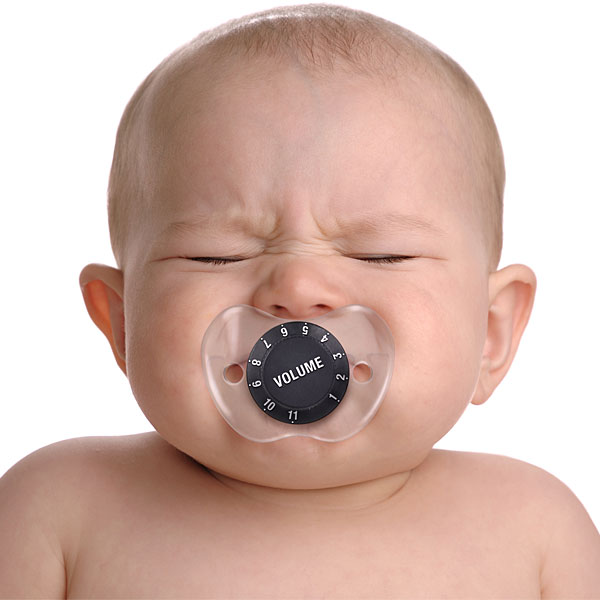The Role of Pacifiers in Newborn Sleep
Can newborn sleep with pacifier? Pacifiers have long been a helper for parents soothing their newborns. They can help babies sleep by mimicking the calming effect of sucking. When a newborn sucks on a pacifier, it releases natural chemicals in their brain. These chemicals help the baby relax and fall asleep. Parents often wonder if newborns can sleep with a pacifier safely. The answer is yes, but there are some guidelines to follow.

For example, pacifiers can reduce the risk of Sudden Infant Death Syndrome (SIDS). They keep the airways open by preventing the baby’s tongue from covering the air passage. Also, a pacifier can provide a sense of security. Many babies feel safe and snug with a pacifier during sleep. This can make bedtime easier for both baby and parents.
However, it’s important to introduce the pacifier at the right time. It should be after breastfeeding is well-established to avoid nipple confusion. Also, choosing the right type of pacifier for your newborn is crucial. Parents should opt for one-piece pacifiers with a shield to ensure safety. Additionally, one must always be aware of the potential risks, such as ear infections and dental issues, when using pacifiers during sleep.
In summary, pacifiers can play a beneficial role in your newborn’s sleep. They are a tool that, when used correctly, can provide safety and comfort. But it’s vital to follow safe practices in their use. In the following sections, we will explore how to choose the correct pacifier, manage risks, and maintain hygiene.
When to Introduce a Pacifier to a Newborn
Deciding when to introduce a pacifier to a newborn is a key step for parents. The recommended time is after breastfeeding has been established, usually around 3-4 weeks old. This helps to prevent nipple confusion, ensuring the baby has learned proper latching techniques. Introducing a pacifier too early can interfere with breastfeeding. It’s important for the baby to prioritize feeding from the breast or bottle before becoming accustomed to the pacifier. If you are bottle-feeding, you may have more flexibility. You can start to offer a pacifier once your newborn has a consistent feeding routine.
Research suggests waiting for a month can make it less likely for babies to develop a strong dependency on the pacifier. This makes weaning off the pacifier easier later on. While there is no one-size-fits-all answer, observing your child’s habits can guide you. Some babies may show signs they are ready for a pacifier earlier, while others may not show interest until later. When you decide to introduce the pacifier, do so during a calm time. Avoid using it as the first line of comfort. Try soothing your newborn in other ways first, like cuddling or rocking.
Choosing the Right Pacifier for Your Newborn
Selecting the ideal pacifier for your child is essential. Start with a one-piece design. This minimizes choking hazards as there are no small parts. The shield should be firm but breathable, with air holes for safety. This prevents suffocation risks.
Look for BPA-free materials to avoid harmful chemicals. A soft, rounded nipple part is best. It should mimic the breastfeeding experience. Size matters too. Ensure it matches your baby’s mouth size.
Always check age recommendations on pacifier packaging. Newborn-sized pacifiers are suited for their tiny mouths.
Consider a pacifier that supports natural oral development. Orthodontically shaped pacifiers can reduce future dental issues.
The handle should be easy to grip but not long enough for your newborn to pull into their throat.
Lastly, have a few extras on hand. Pacifiers get lost or dirty often. Replacing them quickly is vital for hygiene. Make sure you have enough to rotate through.
Remember, ‘can newborn sleep with pacifier’ is a common question for parents. The right pacifier can indeed support safe and comfortable sleep. It’s just about making sure all factors are considered.

Potential Risks and Benefits of Pacifier Use During Sleep
The use of pacifiers while sleeping offers both advantages and disadvantages. It’s crucial for parents to understand these to make informed choices for their newborn’s sleep routine.
Benefits of Pacifier Use During Sleep
- SIDS Prevention: The most significant benefit is the potential to reduce the risk of SIDS. Pacifiers can keep a baby’s airway open by preventing the tongue from covering the throat.
- Comfort and Security: Many newborns find great comfort in sucking on a pacifier. It helps them feel secure and can make the process of falling asleep much smoother.
- Pain Relief: Sucking on a pacifier can provide a form of pain relief, such as during vaccinations or medical procedures.
However, parents must balance these benefits with potential risks to ensure they are using pacifiers safely.
Risks of Pacifier Use During Sleep
- Ear Infections: Frequent pacifier use, especially beyond the age of 2, can lead to an increased risk of ear infections.
- Dental Problems: Long-term pacifier use may affect a child’s teeth alignment and oral development.
- Nipple Confusion: Introducing a pacifier too early can cause nipple confusion in breastfed babies, leading to feeding difficulties.
- Dependency: Some children may become dependent on the pacifier for sleep, which can be a hard habit to break.
Parents should weigh these risks and benefits and consult with their pediatrician. With the right approach, one can maximize the benefits of pacifier use while minimizing the risks. It is always advisable to keep watch for any signs of discomfort or adverse effects and to respond accordingly.
In the next sections, we’ll explore how to maintain proper pacifier hygiene and offer tips for managing pacifier care.

Best Practices for Pacifier Hygiene and Care
Keeping your newborn’s pacifier clean is as important as choosing the right one. Good hygiene practices prevent germs from causing infections. Here are key steps for maintaining your pacifier’s cleanliness.
Sterilize Before First Use
Before your baby first uses a pacifier, sterilize it. Boil it in water for five minutes. This kills any lurking germs.
Clean Regularly
After each use, clean the pacifier with warm, soapy water. Rinse it well. This helps remove saliva or any other residue.
Use a Pacifier Case
When not in use, store the pacifier in a clean case. This protects it from dirt and germs.
Avoid Sharing Pacifiers
Never let another child use your baby’s pacifier. Sharing can spread illness.
Check for Damage
Regularly inspect the pacifier for wear and tear. Broken parts can be a choking hazard.
Replace When Needed
Pacifiers should not last forever. Replace them every two months, or sooner if they show signs of damage.
Don’t Dip It in Sweet Solutions
Never dip a pacifier in sugar, honey, or syrup. This can cause tooth decay, even in infants.
Dry Thoroughly
After cleaning, make sure the pacifier is completely dry before giving it back to your baby. This averts mold growth.
By following these simple steps, you can ensure that your newborn can sleep with a pacifier safely and hygienically. Being consistent with pacifier care helps create a safe sleeping environment for your baby.
Understanding Sleep Training and Pacifier Dependency
When considering pacifier use, understanding sleep training is important for parents. Sleep training teaches babies to fall asleep on their own. A key goal is to help them sleep through the night without aid. But using a pacifier can lead to dependency. This means your baby may struggle to sleep without it.
To prevent this, introduce the pacifier as just one of many soothing strategies. Use it along with rocking, singing, or swaddling. Try not to offer the pacifier every time your baby cries. Instead, use it selectively. This helps your newborn adapt to various comfort methods.
During sleep training, you might use the pacifier to calm your baby. Once they’re sleepy, consider removing the pacifier. This encourages self-soothing if they wake up during the night. Pacifier dependency may become an issue if it’s the only way your baby can fall asleep. If you find this is becoming a pattern, it’s time to make changes.
Keep a close eye on your baby’s sleep habits. Be ready to phase out the pacifier if you notice signs of dependency. As your baby grows, their need for a pacifier should lessen. Be patient and consistent. With time, your child can learn to sleep without relying on a pacifier.
How to Wean Your Child Off the Pacifier
Weaning your child off a pacifier involves patience and consistency. Here’s a step-by-step approach to help your newborn transition away from pacifier use during sleep.
Start Gradually
Begin reducing pacifier use during the day. Offer it less often to your child. Distraction is key. Offer other forms of comfort like toys or extra cuddles.
Set Limits
Choose specific times when the pacifier is allowed, such as during naps or nighttime. Stick to these rules to avoid confusion for your baby.
Offer Alternatives
When your baby asks for the pacifier, provide alternative soothing methods. This could be a stuffed animal, a cozy blanket, or some quiet time together.
Positive Reinforcement
Praise your child for going without the pacifier. Positive feedback encourages them to continue making progress.
Prepare for Crying or Protest
Your child might cry or resist the change. Stay calm and offer comfort in other ways. Consistency is vital at this stage.
Have a ‘Pacifier Fairy’ Visit
Some parents find success with a ‘pacifier fairy’ who ‘takes’ the pacifier in exchange for a small gift. This can turn weaning into a positive experience.
Be Prepared for Setbacks
Weaning doesn’t always go smoothly. If your child reverts back to wanting the pacifier, be patient. Stick to your plan and adjust as needed.
Celebrate the Milestone
Once your child is pacifier-free, celebrate the achievement together. It’s a big step for your little one.
By following these steps, you can help your newborn sleep without reliance on a pacifier. Keep the keyword ‘can newborn sleep with pacifier’ in mind. It’s a yes, but as they grow, helping them sleep without a pacifier is beneficial for their development.


